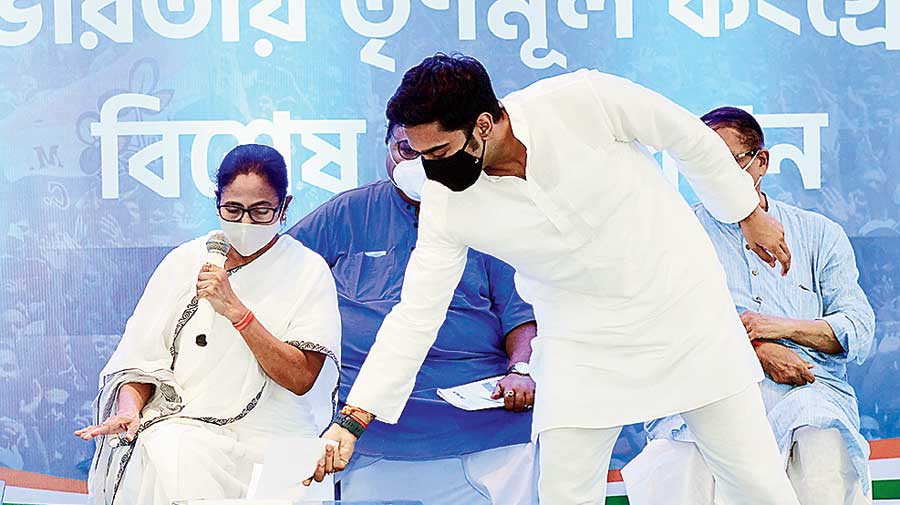Abhishek Banerjee, Mamata Banerjee’s nephew and till now the Trinamul youth wing chief, on Saturday succeeded Subrata Bakshi as the all-India general-secretary, a post held for years by Mukul Roy before he joined the BJP.
Bakshi, one of Mamata’s most trusted lieutenants, will continue as the state president of the party.
On Saturday, the formal seal of approval was given at a two-part organisational meeting chaired by Mamata Banerjee at party headquarters.
“Humbled at the new role that @AITCofficial has bestowed upon me. I thank every single soldier of the party who fought this battle shoulder to shoulder with me despite all odds and helped Bengal emerge victorious,” tweeted Abhishek, 33, and the party’s Diamond Harbour MP, in the evening.
“I assure all that I will leave no stone unturned towards the service of the people & take @MamataOfficial’s message to every nook & corner in India in the days to come. I bow to all the senior colleagues in the party who stood by the party & its values despite all odds,” he added.
Sayani Ghosh, the 28-year-old actor who recently joined Trinamul and lost from Asansol South, was picked to succeed Abhishek at the helm of the youth wing.
The historic mandate of the Bengal election was in some ways, a referendum on Trinamul’s succession plan, made so by Narendra Modi-Amit Shah’s key poll plank against alleged bua-bhatijavad (“aunt-nephewism”).
A Trinamul vice-president said with the poll results, Abhishek silenced critics outside and within the party. “Many expressed reservations regarding him. Some left for the BJP, mainly over their differences with him, such as Suvendu (Adhikari) and Mukul (Roy). His methods, especially after he got (poll consultant) Prashant Kishor on board, were questioned by many. But he did not budge from what he believed was right for the party,” he said.
He pointed out how, in every public statement for months, Prime Minister Modi, home minister Shah, BJP chief J.P. Nadda and others from the party’s national and state leadership spoke about bhatija or bhaipo (nephew).
Subrata Mukherjee, a Trinamul veteran, said: “The old must make way for the new.... The next generations have to be readied, so that they can carry the mantle forward. Mamata was once a youth leader. I was too…. Abhishek has truly earned it.”
Mukherjee and several others in the party lavished praise on Abhishek’s role, especially after the setback of the general election in 2019 in which the BJP made unprecedented gains.
Abhishek, said a senior minister, was instrumental, along with Kishor, in setting up the election war room for the party, one of several unprecedented exercises that apparently paid off very well. He said Abhishek was also behind the bohiragawto (outsider) versus Banglar nijeyr meye (Bengal’s own daughter) pitch that Mamata pursued relentlessly in her campaign.
“Abhishek played a key role in everything, from shortlisting of candidates based on their winnability for her (Mamata’s) final selection, to countering the BJP’s polarising campaign with Bengali sub-nationalism,” said the minister, adding that the Diamond Harbour MP was second only to his aunt in crisscrossing Bengal in the intense campaign, holding over 100 rallies and roadshows.
Besides Abhishek’s promotion, two crucial elements from the two-part meeting stood out.
First, as Trinamul secretary-general Partha Chatterjee announced, instructions were issued by the Bengal chief minister in her third consecutive term in power to enhance the party’s organisational presence and strength in other parts of the country.
This is in keeping with Mamata’s refuelled national ambitions in the run-up to the Lok Sabha election of 2024. Poll strategist Kishor and his team have returned, and are now likely to focus, over the next three years, on furthering Trinamul’s national agenda.
Second, Mamata’s purported stress on the need for a “clean image”.
“She warned against excesses, against complacency, against allowing this mandate to be sullied by allegations of graft or popular resentment against ostentatious shows of wealth or clout. She repeatedly underscored how the historic mandate should bring with a greater sense of responsibility and humility,” said a senior MP.
At the meeting, Trinamul adopted the “one person, one post” policy in the party, at least on principle. Secretary-general Chatterjee said it would, in a process meticulously overseen by the supreme leadership, be implemented over the next few weeks.











